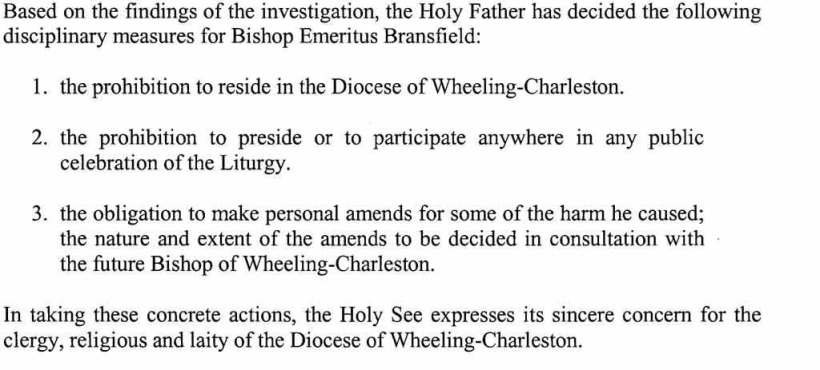On Friday afternoon, Pope Francis intervened in the Bransfield affair. He “sanctioned” Bishop Bransfield…

—
An innocent question: For what reason did Pope Francis impose these sanctions?
Not easy to draw a conclusion about that. Since the Vatican communique has nothing whatsoever to say about Bransfield’s actual crimes. As usual, you have to do extensive background research, even to begin to understand the oracles of the Church mafia.

In March Archbishop Lori had suspended Bransfield from ministry pending a review of the case by the Holy See. Lori made no mention whatsoever of any particular crimes of which Bransfield had been found guilty by an ecclesiastical judge.
Then an insider leaked to the Washington Post the details of the report that Lori had sent to Rome. And also leaked the version Lori had not sent–the one that disclosed the money he had taken from Bransfield.
The leak forced Lori to address the matter with a public letter, to try to explain away his backroom subterfuge. In that June 5 letter, Lori reported that investigators had determined that “allegations” against Michael Bransfield of “sexual harassment” were “credible.”
“The team uncovered a consistent pattern of sexual innuendo, and overt suggestive comments and actions toward those over whom the former bishop exercised authority.”
Lori went on to write, “It should be noted that due to privacy concerns and at the request of those who alleged harassment by Bishop Bransfield, the alleged victims and their personal accounts, which for them are a source of deeply-felt pain and humiliation, will not be disclosed by the Diocese.”
Strange thing to write, since one of the victims had filed a lawsuit against Bransfield, and the diocese, two months earlier, in which the victim explicitly recounted the details of an incident. An incident that rises to the level not just of sexual harassment but of sexual assault.
Nothing in Lori’s June 5 letter even so much as accuses Bransfield of any recognizable specific ecclesiastical crime, much less finds him guilty of any.
Lori also wrote in his June 5 letter that “the investigative report determined that during his tenure as Bishop of Wheeling-Charleston, Bishop Bransfield engaged in a pattern of excessive and inappropriate spending.”
Lori went on to acknowledge, however, that Bransfield never departed from any of the normal rules of financial oversight.
Lori explains that in this way: Bransfield’s “management style and personality undermined the effectiveness of diocesan policies, controls and oversight procedures. In some cases, it is apparent that the judgment of diocesan personnel was impacted by the culture of fear of retaliation and retribution that the former bishop fostered.”
A believable-enough characterization. But also lacking any specific accusations of concrete criminal acts.
So maybe we can understand Pope Francis’ “sanctions” in one of two ways.
1. As a medicinal punishment, aimed at the bishop’s repentance. After all, Michael Bransfield finds himself increasingly close to the end of his earthly pilgrimage.
But Bransfield, according to the Philadelphia Inquirer, flatly denies all the accusations against him.
So maybe the pope’s sanctions are not so much a medicinal penalty as a kind of “plea bargain.” The prosecution decides to skip the hard task of making a case based on clear laws and concrete evidence, and the defendant accepts a token punishment.
2. On the other hand, the Vatican communique about the sanctions claims that the pope has acted out of “sincere concern for the clergy, religious, and laity of the Diocese of Wheeling-Charleston.”
That would seem to mean–or should mean, anyway–that the sanctions intend to restore justice and equilibrium to the life of the local church.
As they are, they manifestly do not do that. All the particulars of restitution are left to future negotiations between Bransfield and an as-yet-non-existent person. (Apparently we’ll learn the new bishop’s identity tomorrow. )
And the pope has made no provision whatsoever for the possibility of an irreconcilable dispute arising in the course of the restitution negotiations. Considering the fact that Bransfield denies all wrongdoing, such an dispute seems inevitable. Unless the next bishop of Wheeling-Charleston decides just to forget the whole thing.
…This would be simply an embarrassing joke of a situation, if it weren’t for the fact that we have to face this:
The lawsuit filed by Bransfield’s sex-assault victim in West Virginia asserts a conspiracy on the part of McCarrick and Bransfield, to give Bransfield access to young men upon whom he could prey. (McCarrick participated in Bransfield’s ordination as a bishop in 2005.)
Now, this claim probably amounts to nothing more than legal boilerplate, intended to intimidate the defendants into settling the case for a large sum. As far as we know, no one has the kind of hard evidence of an episcopal sex-predator conspiracy that could hold up in a court of law.
But now, a year after James Grein went to the New York Times, we Catholics find ourselves with a pretty stark choice.
Either to believe by some impossible mental gymnastics that the pope really means well–but for some reason can’t attain forthrightness and clarity when it comes to sexually predatory bishops.
Or to recognize: Pope Francis cannot, will not clean up this mess. Because either he simply does nor have the mind, or the will. Or: he is himself a sexually predatory bishop, or wishes he were.